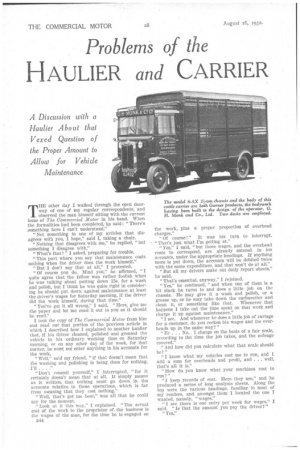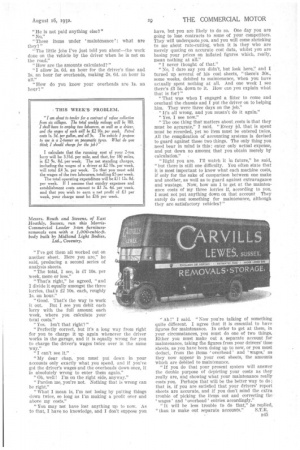Problems of the
Page 62

Page 63

If you've noticed an error in this article please click here to report it so we can fix it.
HAULIER and CARRIER
A Discussion with a Haulier About that Vexed Question of the Proper Amount to Allow for Vehicle Maintenance
THE other day I walked through the open doorway of one of my regular correspondents, and observed the man himself sitting with the current issue of The Commercial Motor in his hand. When the formalities had been completed, lie said: "There's something here I can't understand."
"Not something in one of my articles that disagrees with you, I hope," said I, taking a chair.
"Nothing that disagrees with me," he replied, "but something I disagree with."
"What's that?" I asked, preparing for trouble. "This part where you say that maintenance costs nothing when the driver does the work himself." "But I don't say that at all," I protested.
"Of course you do. Mind you," he affirmed, "I quite agree that the fellow was rather foolish when he was talking about putting down 15s. for a wash and polish, but I think he was quite right in considering he should put down against maintenance at least the driver's wages for Saturday morning, if the driver did the work himself, during that time."
"You've got it all wrong," I said. "Here, give me the paper and let me read it out to you as it should he read."
I took the copy of The Commercial Motor from him and read out that portion of the previous article in which I described how I explained to another haulier that, if his driver cleaned, polished and greased the vehicle in his ordinary working time on Saturday morning, or on any other day of the week, for that matter, he must not enter anything in his accounts for the work, "Well," said my friend, "if that doesn't mean that the washing and polishing is being done for nothing, I'll . . . ."
"Don't commit yourself," I interrupted, "for it certainly doesn't mean that at all. It simply means as is written, that nothing must go down in the accounts relative to those operations, which is far from meaning that they cost nothing."
" Well, that's got me beat," was all that he could say for the moment, "Look at it this way," I explained. "The actual cost of the work to the Proprietor of the business is the wages of the man, for the time he is engaged on n44 the work, plus a proper proportion of overhead charges."
"Of course!" It was his turn to interrupt. " That's just what I'm getting at." "Yes," I said, "but those wages, and the overhead costs to correspond, are already entered in his accounts, under the appropriate headings. If anything more is put down, the accounts will be debited twice with the same expenditure; and that won't do at all." But all ray drivers make out daily report sheets," he said.
"That's essential, anyway," I rejoined.
"Yes," he continued, "and when one of them is a bit slack he tuns to and does a little job on the chassis. He may give it a wash and polish, or a grease up, or he may take down the carburetter and clean it, or something like that. Whenever that happens I take out the time spent on that work and charge it up against maintenance."
"I see. And whenever he does a little job of cartage for a customer, do you reckon his wages and the overheads up in the same way?" "Er . . . No. I charge on the basis of a fair scale, according to the time the job takes, and the mileage covered."
"And how did you calculate what that scale should be'? '
"I know what my vehicles cost me to run, and I add a sum for overheads and profit, and . . . well, that's all it is."
"How do you know what your machines cost to run?"
" I keep records of cost. Here they are," and he produced a series of long analysis sheets. Along the top were the various headings, familiar to most of my readers, and amongst them I located the one I wanted, namely, "wages."
"I see there is one entry per week for wages," I
said. "Is that the amount you pay the driver?" Li yes:, He is not paid anything else?" " No," "These items under 'maintenance what are they?"
"The little jobs I've just told you about—the work done on the vehicle by the driver when he is not on the road," "How are the amounts calculated?"
"I allow is. 6d. an hour for the driver's time and Is. an hour for overheads, making 2s, 6d. an hour in "How do you know your overheads are Is. an hour?"
" I've got them all worked out on another sheet. Here you are," he said, producing a second series of analysis sheets.
" The total, I see, is £7 10s. per week, more or less."
"That's right," he agreed, "and I divide it equally amongst the three lorries, that's £2 10s. each, roughly is. an hour."
"Good. That's the way to work it out. But I see you debit each lorry with the full amount each week, where you calculate your total costs."
"Yes. Isn't that right?"
" Perfectly correct, but it's a long way from right for you to charge it up again whenever the driver works in the garage, and it is equally wrong for you to charge the driver's wages twice over in the same way."
" I can't see it."
"My dear chap, you must put down in your accounts only exactly what you spend, and if you've got the driver's wages and the overheads down once, it is absolutely wrong to enter them again."
"Oh, well! I'm on the right side, anyway." "Pardon me, you're not. Nothing that is wrong can be right," "What I mean is, I'm not losing by putting things down twice, so long as I'm making a profit over and above my costs."
"You may not have lost anything up to now. As to that, I have no knowledge, and I don't suppose you have, but you are likely to do so. One day you are going to lose contracts to some of your competitors. They will underquote, you, and you will come shrieking to me about rate-cutting, when it is they who are merely quoting on accurate cost data, whilst you are basing your prices on inflated figures which, really, mean nothing at all."
"I never thought of that."
"No, I dare say you didn't, but look here," and I turned up several of his cost sheets, "there's 30s., some weeks, debited to maintenance, when you have actually spent nothing at all. And one week I see there's £3 5s. down to it. How can you explain what that is for?"
"That was when I engaged a fitter to come and overhaul the chassis and I put the driver on to helping him. They were three days on the job."
"It's all wrong, and you mustn't do it again." "Yes, I see now."
The one thing that matters about.costs is that they must be accurate," I said. "Every id. that is spent must be recorded, yet no item must be entered twice. All the complication of accounting systems is devised to guard against those two things. The only thing you need bear in mind is this: enter only actual expense, and put down no amount that you obtain merely by calculation."
"Right you are. I'll watch it in future," he said, "but there is still one difficulty. You often state that it is most important to know what each machine costs, if only for the sake of comparison between one make and another, as well as to guard against extravagance and wastage. Now, how am I to get at the maintenance costs of my three lorries if, according to you, I must not put anything down on that account They surely do cost something for maintenance, although they are satisfactory vehicles?"
" Ah I" I said. "Now you're talking of something quite different. I agree that it is essential to have figures for maintenance. In order to get at them, in your circumstances, you must do one of two things. Either you must make out a separate account for maintenance, taking the figures from your drivers' time sheets, as you have been doing up to now, or you must deduct, from the items -` overhead' and 'wages,' as they now appear in your cost sheets, the amounts which are debited to maintenance.
"if you do that your present system will answer the double purpose of depicting your costs as they really are, and showing what your maintenance really costs you. Perhaps that will be the better way to do; that is, if you are satisfied that your drivers' report sheets are accurate, and if you don't mind the extra trouble of picking the items out and correcting the• ' wages ' and ' overhead ' en-tries accordingly."
"It will be less trouble to do that," he replied, "than to make out separate accounts." S.T.R.




































































































